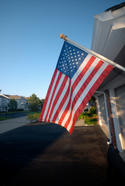Let’s look at general urban settlement and suburbia from a geographic and demographic, not a planning or ideological viewpoint. There’s really no point to the fruitless and unscientific harangues about how people ought to live or about allegedly better or poorer forms of settlement. read more »
Demographics
The future of urban settlement? Look in the suburbs
- Login to post comments
Suburbs will decide the election
By Joel Kotkin and Mark Schill
Suburbs may not have cooked up the mortgage crisis, but they absorbed much of initial damage. Now that Wall Street and the big cities are also taking the fall, suburbanites might feel a bit better — but there’s still lots of room for anger out in the land of picket fences, decent schools and shopping malls. read more »
- Login to post comments
Boomers Go Back to College? - A Letter from Pennsylvania
The “boomers” is a generation born between 1946 and 1964. They gave us the youth culture, hippies, Woodstock, peace movement, women’s liberation, computers, flexible work environments, consumer electronics and consumption on the grand scale to mention only a few.
Boomers have enjoyed a wonderful economy in the main that has enabled them to build wealth and live middle class lifestyles. They stay fit. They eat healthy foods. They look young compared to people of previous generations at their age. read more »
- Login to post comments
Time to Reinvent College Towns?
By Joel Kotkin and Mark Schill
For much of their history college towns have been seen primarily as “pass through” communities servicing a young population that cycles in and out of the community. But more recently, certain college communities have grown into “knowledge-based” hot spots --- Raleigh-Durham, Madison, Cambridge and the area around Stanford University --- which have been able to not only retain some graduates but attract knowledge workers and investors from the rest of the country.
But a large proportion of college towns do not seem to be doing so well. read more »
A New Model for New York --- San Francisco Anyone?
From the beginning of the mortgage crisis New York and other financial centers have acted as if they were immune to the suffering in the rest of country. As suburbs, exurbs and hard-scrabble out of the way urban neighborhoods suffered with foreclosures and endured predictions of their demise, the cognitive elites in places like Manhattan felt confident about their own prospects, property values and jobs. So what if the rubes in Phoenix, Las Vegas, Tampa and Riverside all teetered on the brink? read more »
- Login to post comments
Geography, Class, and Red and Blue Voting
Consider the following two apparently contradictory sets of statistics:
From the Republican convention and much of the media, you’d get the impression that class voting has turned upside down—that the Democrats are the party of the “elite” and the Republicans the new friends of the “working class”. read more »
America is More Small Town than We Think
America has become an overwhelmingly metropolitan nation. According to the 2000 census, more than 80 percent of the nation’s population resided in one of the 350 combined metropolitan statistical areas. It is not surprising, therefore, that “small town” America may be considered as becoming a burdensome anachronism.
Nothing could be further from the truth. America is more “small town” than we often think, particularly in how we govern ourselves. read more »
Rural America could bring boon to Dems
By Joel Kotkin and Mark Schill
Perhaps no geography in America is as misunderstood as small towns and rural areas. Home to no more than one in five Americans, these areas barely register with the national media except for occasional reports about the towns’ general decrepitude, cultural backwardness and inexorable decline.
Yet in reality this part of America is far more diverse, and in many areas infinitely more vital, than the big-city-dominated media suspects. In fact, there are many demographic and economic dynamics that make this part of America far more competitive this year than in the recent past. read more »
- Login to post comments
Keeping Kids Downtown - A Philadelphia Approach
As children return to classes in Philadelphia this week, more than half of the kindergarteners attending three downtown public elementary schools will come from their immediate middle-income neighborhoods. Three private schools that also serve this area, drawing over 70 percent of their enrollment from downtown families, are bursting at the seams. Having doubled and tripled pre-school programs over the last half decade, each is now physically expanding to accommodate the 11,200 children, born to downtown parents between 2000 and 2005. read more »
- Login to post comments
Cities, Children and the Future
By Joel Kotkin and Mark Schill
“Suburbs,” the great urbanist Jane Jacobs once wrote, “must be a difficult place to raise children.” Yet, as one historian notes, had Jacobs turned as much attention to suburbs as she did to her beloved Greenwich Village, she would have discovered that suburbs possessed their own considerable appeal, particularly for those with children.
Although some still hold onto the idea that suburbs are bad places to raise children, in virtually every region of the country, families with children are far more likely to live in suburbs than in cities. read more »





















